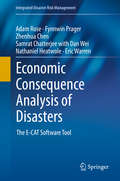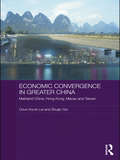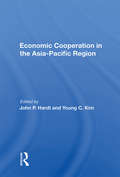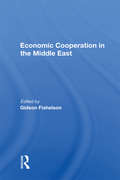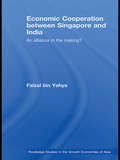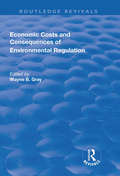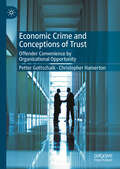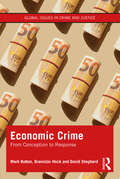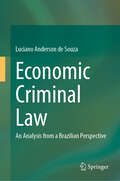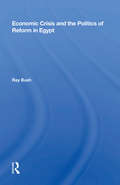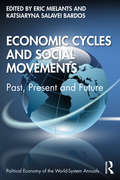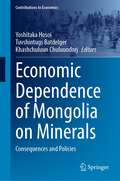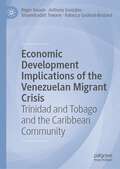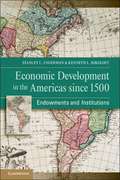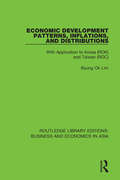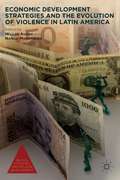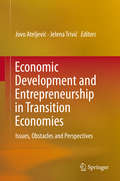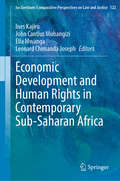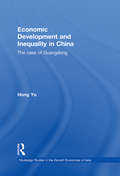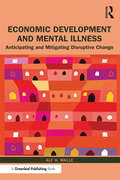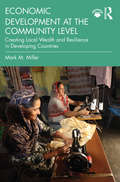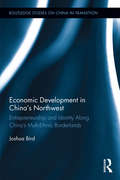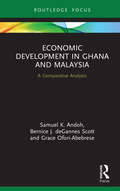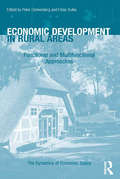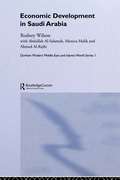- Table View
- List View
Economic Consequence Analysis of Disasters
by Dan Wei Adam Rose Fynnwin Prager Zhenhua Chen Samrat Chatterjee Nathaniel Heatwole Eric WarrenThis study develops a methodology for rapidly obtaining approximate estimates of the economic consequences from numerous natural, man-made and technological threats. This software tool is intended for use by various decision makers and analysts to obtain estimates rapidly. It is programmed in Excel and Visual Basic for Applications (VBA) to facilitate its use. This tool is called E-CAT (Economic Consequence Analysis Tool) and accounts for the cumulative direct and indirect impacts (including resilience and behavioral factors that significantly affect base estimates) on the U. S. economy. E-CAT is intended to be a major step toward advancing the current state of economic consequence analysis (ECA) and also contributing to and developing interest in further research into complex but rapid turnaround approaches. The essence of the methodology involves running numerous simulations in a computable general equilibrium (CGE) model for each threat, yielding synthetic data for the estimation of a single regression equation based on the identification of key explanatory variables (threat characteristics and background conditions). This transforms the results of a complex model, which is beyond the reach of most users, into a "reduced form" model that is readily comprehensible. Functionality has been built into E-CAT so that its users can switch various consequence categories on and off in order to create customized profiles of economic consequences of numerous risk events. E-CAT incorporates uncertainty on both the input and output side in the course of the analysis.
Economic Convergence in Greater China: Mainland China, Hong Kong, Macau and Taiwan (Routledge Studies on the Chinese Economy)
by Shujie Yao Chun Kwok LeiAlthough China's economy has grown very rapidly in recent decades, there are still very large differences between the economy of mainland China and the economies of Hong Kong, Macau and Taiwan. For example, per capita income in Hong Kong is many, many times higher than per capita income in mainland China. This book considers the degree to which economic convergence between mainland China, Hong Kong, Macau and Taiwan has occurred, and the prospects for increased convergence in the future. It considers economic integration between China and its two Special Administrative Regions (SARS), emphasising the large volume of capital flows and exports, especially from Hong Kong into China, and showing that the economies are highly integrated, despites their differences. It examines income convergence, and changes in productivity, using the same measures for both China and the two SARS, unlike most existing studies. It explores how economic reforms have been crucial to increasing convergence so far, and will continue to be in the future, and concludes by discussing the implications for policy of encouraging increased convergence.
Economic Cooperation In The Asia-pacific Region
by John P HardtThe Asia-Pacific region has, in the eyes of most observers, the potential to become the engine of global economic growth in the 21st century. Whether it does will largely depend upon the willingness of the region's nations to pursue economic co-operation and peaceful reconciliation of differences. In this volume, scholars, policy experts, and repre
Economic Cooperation In The Middle East
by Gideon FishelsonThis book is an outcome of conference on Economic Cooperation in the Middle East held at Tel Aviv University in 1986. It examines economic integration in the Middle East, its implications and possible costs. The book analyzes the consequences of peace and economic cooperation in the Middle East.
Economic Cooperation between Singapore and India: An Alliance in the Making? (Routledge Studies In The Growth Economies Of Asia)
by Faizal bin YahyaAsian interregional economic cooperation has assumed greater prominence with the rise of Asia‘s two giant economies of China and India. The economic liberalization of China‘s economy in 1979, followed by India in 1991, signalled the presence of business opportunities to foreign investors - including those from Asia. This book examines the growing e
Economic Costs and Consequences of Environmental Regulation (Routledge Revivals)
by Wayne B. GrayThis title was first published in 2002. How expensive is environmental regulation and how does it affect the economy? A proper understanding of the costs imposed by environmental regulation is important for policy-makers and others concerned with regulatory design. This book focuses on empirical studies of the impact of environmental regulation on the economy, exposing the reader to a variety of estimation methodologies and datasets that have been used in this area. Three basic sources provide information on the costs of environmental regulation: surveys; engineering studies; and econometric analysis. This text draws on all three in its investigation.
Economic Crime and Conceptions of Trust: Offender Convenience by Organizational Opportunity
by Petter Gottschalk Christopher HamertonEconomic Crime and Conceptions of Trust explores the intricacies of the contemporary concept of trust in episodes of misconduct through an analysis of workplace deviance and crime. Grounded in detailed examinations of contemporary case studies and bolstered by original comparative fieldwork, the text takes an offender-focused approach, emphasizing the pivotal role of convenience. Adopting an interdisciplinary perspective, the authors seek to enhance and broaden existing understanding of white-collar and corporate criminology, while also highlighting its relevance to strategic management studies. A core argument of the book is that the traditional emphasis on individual actors and notions of trustworthiness when conceptualising white-collar has waned in recent times. The authors’ perspective revisits and builds upon this important foundational concept of late twentieth-century discourse within the discipline, signalling a need for a reassessment and highlighting a number of recent conceptual developments to evaluate and position trust within the twenty-first century globalized business sphere.
Economic Crime: From Conception to Response (Global Issues in Crime and Justice)
by Mark Button David Shepherd Branislav HockThis book is the first attempt to establish 'economic crime' as a new sub-discipline within criminology. Fraud, corruption, bribery, money laundering, price-fixing cartels and intellectual property crimes pursued typically for financial and professional gain, have devastating consequences for the prosperity of economic life. While most police forces in the UK and the USA have an ‘economic crime’ department, and many European bodies such as Europol use the term and develop strategies and structures to deal with it, it is yet to grain traction as a widely used term in the academic community. Economic Crime: From Conception to Response aims to change that and covers: definitions of the key premises of economic crime as the academic sub-discipline within criminology; an overview of the key research on each of the crimes associated with economic crime; public, private and global responses to economic crime across its different forms and sectors of the economy, both within the UK and globally. This book is an essential resource for students, academics and practitioners engaged with aspects of economic crime, as well as the related areas of financial crime, white-collar crime and crimes of the powerful.
Economic Criminal Law: An Analysis from a Brazilian Perspective
by Luciano Anderson SouzaThis book investigates the legitimacy of Economic Criminal Law. Initially, it examines the history of the intersection between criminal law and economy, aiming at finding a possible evolutionary trait. Then it defines what is meant by Economic Criminal Law, and whether it would be necessary and possible to subsume it to the protected interest theory. Subsequently it analyzes theories that intend to equate the administratisation of criminal law, highlighting the proposed administrative-punitive. Finally, the conclusion searches for the best legal construction of the rules for economic infractions, limiting the role of criminal law in this context. The imperiousness of effective protection of the economic environment seems undeniable today. The structure of post-industrial capitalist system reveals, paradoxically, features unwanted by the existing mode of production, which the contemporary sociology understands as the reflexivity of risk society. In this sense, the economic agents undertake conduct detrimental to the conformation of the economic society, undermining the smooth functioning of the economy itself. In this context, the law, especially the criminal law, is used to try to head them off. It happens that such employment of legal and judicial branch clashes with their traditional boundaries, delineated since the Enlightenment. Complex economic behavior are criminally prohibited, in most cases through typifying proactive formulations, which are inconsistent and display as mere means of behavioral conformation, subject to administrative jurisdiction, which leads to the administrativization of the criminal law.
Economic Crisis And The Politics Of Reform In Egypt
by Ray BushThis book examines the character and consequences of Egypt's economic reform and structural adjustment programme of 1991, along with the second stage of reforms in 1996. It contributes to the debates underpinning the political economy of economic reform and agricultural reform.
Economic Cycles and Social Movements: Past, Present and Future (Political Economy of the World-System Annuals)
by Eric Mielants Katsiaryna Salavei BardosEconomic Cycles and Social Movements: Past, Present and Future offers diverse perspectives on the complex interrelationship between social challenges and economic crises in the Modern World System. Written with a balance of quantitative, qualitative and theoretical contributions and insights, this volume provides a great opportunity to reflect upon the ongoing conceptual and empirical challenges when confronting the complex interrelations of various economic cycles and social movements. By engaging wide-ranging ideas and theoretical points of view from different disciplines, different countries and different perspectives, this study breaks new ground and offers novel insights into the way the capitalist world economy functions as well as the way social and political movements react to these constraints. Different chapters in this volume bring about novel interdisciplinary approaches to study business cycles, economic changes and social as well as political movements, offer new interpretations and, while examining the complexity of socioeconomic cycles in the long run, present epistemological challenges and a wide variety of empirical data that will increase our understanding of these complex interactions.
Economic Dependence of Mongolia on Minerals: Consequences and Policies (Contributions to Economics)
by Yoshitaka Hosoi Tuvshintugs Batdelger Khashchuluun ChuluundorjThis book is a compass for resource rich-developing countries, taking Mongolia as a case study. Policy aspects of the development of the mining sector in developing countries such as Mongolia and its impact on the economy and society are reviewed. The book deals with specific industry policies and challenges identified by policy makers, its characteristics and policy recommendations moving forward with an emphasis on the importance of evidence-based policy making (EBPM). It begins with the country’s development strategy and the role of the mining industry, highlighting the fact that major strategic and policy documents still suffer from ambiguity and clear guidance as well as gaps in policy directions. The book also highlights the need for policy makers to improve transparency initiatives. Authors emphasize transparency or lack thereof in mining contracts, taxation, trading, and marketing and provide specific policy recommendations and alternative policy actions. The macroeconomic and social impact of the mining sector and the role of foreign direct investment is also discussed. Particularly, utilizing in-house economic analytical tools, the role and impact of resource revenue management policy in Mongolia is evaluated. Further, the impact of mining projects on the livelihood of local households as well as the importance of obtaining a social license to operate is discussed. This monograph is recommended for readers who want an in-depth comprehensive understanding of the mining sector, EBPM, and key lessons learned in managing natural resources in Mongolia.
Economic Development Implications of the Venezuelan Migrant Crisis: Trinidad and Tobago and the Caribbean Community
by Bhoendradatt Tewarie Roger Hosein Anthony Gonzales Rebecca Gookool-BoslandThis book analyzes the ways in which the Venezuelan immigrant community is making an impact on the social and economic dynamic of small economies. This publication addresses some of the main economic development conversations on trade, labor, and fiscal implications of immigration. This book attempts to collate and unpack some of the relevant theoretical frameworks which provide a basis for policymakers and other key decision-makers. In this regard, the links between immigration and economic development is discussed with a focus on Trinidad and Tobago as a representative case within the Caribbean community.
Economic Development In The Americas Since 1500: Endowments And Institutions
by Kenneth L. Sokoloff Stanley L. Engerman Stephen Haber Elisa V. Mariscal Eric M. ZoltThis book brings together a number of previously published articles by Stanley L. Engerman and Kenneth L. Sokoloff. Its essays deal with differences in the rates of economic growth in Latin American and mainland North America, specifically the United States and Canada. It demonstrates how relative differences in growth over time are related to differences in the institutions that developed in different economies. This variation is driven by differences in major institutions - suffrage, education, tax policy, land and immigration policy, and banking and financial organizations. These factors, in turn, are all related to differences in endowments, climate, and natural resources. Providing a comprehensive treatment of its topic, the essays have been revised to reflect new developments and research.
Economic Development Patterns, Inflations, and Distributions: With Application to Korea (ROK) and Taiwan (ROC) (Routledge Library Editions: Business and Economics in Asia #10)
by Byung Ok LimThe focal point of this study, first published in 1991, is to investigate the effect of growth patterns on inflation and the distribution of income through inductive examination of the particular experiences in Korea and Taiwan. Both countries are regarded as models of successful industrialization, but contrast significantly in the matter of their development strategy yielding a more equitable distribution of income, along with a moderate inflation from the benefits of economic growth. Korea experienced considerable rates of inflation and a worsening of the distribution of income, while Taiwan avoided both economic evils. This book analyses how Taiwan’s economy managed to reconcile growth with inflation and distribution and why Korea could not achieve similar performance.
Economic Development Strategies and the Evolution of Violence in Latin America
by Natalia Mirovitskaya William AscherEconomic Development Strategies and the Evolution of Violence in Latin America explores the links between Latin American governments' economic policies and the nature and dynamics of inter-group violence. Based on the patterns of ten countries, the contributions to this volume trace the remarkable transformation from open ideological conflict to the explosion of social (seemingly apolitical) violence, the upsurge of urban crime, and the confrontations over natural resources and drugs across the region spanning from Mexico to Argentina. The variations in economic success and in conflict prevention and transformation can guide policymakers, development professionals, and activists committed to conflict-sensitive development.
Economic Development and Entrepreneurship in Transition Economies
by Jovo Ateljević Jelena TrivićThis book contributes to a better understanding of entrepreneurship in transition economies. Current literaturereflects the more traditional schools of thought on entrepreneurship, which areinfluenced by the Western perspective, and fail to fully address the scenarioin transition economies. There is a broad consensus among academics, policymakers, and practitioners that a fundamental cause of difficulties experiencedby most economies in transition has been the fact that reform has not been accompaniedby the creation of new, private businesses, and particularly SMEs. This isespecially evident in states created in Europe after the dissolution of theSoviet Union where many barriers, which were inherited from the old system,remain in place, thus inhibiting entrepreneurial progress in these countriesdespite a favorable political and economic environment. The contributions featuredin this book focus on how much progress has been achieved so far with regard tothese aspects, as well as identify which current barriers and issues still needto be resolved. Themes include innovation performance, financing, venturecapital, educational factors, and entrepreneurial learning.
Economic Development and Human Rights in Contemporary Sub-Saharan Africa (Ius Gentium: Comparative Perspectives on Law and Justice #122)
by Ines Kajiru John Cantius Mubangizi Elia Mwanga Leonard Chimanda JosephThis book explores the connections between economic development and the protection of human rights. Drawing on experiences from Sub-Saharan African countries, the book demonstrates how various economic activities impact the protection of human rights in Sub-Saharan Africa. The book explores the core concepts and principles, theory and practice, accountability mechanisms, and key challenges to the protection of human rights in Sub-Saharan Africa in the era of global economic development. It also shows the ways in which human rights law and development can be used to obtain relief for the victims of environmental degradation or adverse effects of climate change in Africa. In addition, it places emphasis on development and economic policies to highlight the pros and cons of using human rights-based approaches and its significance in the context of economic development and human rights in Africa. The book is divided into three parts: Part I focuses on the conceptual and theoretical foundations of human rights and economic developments in Africa and covers essential concepts, historical perspectives, the African human rights framework, human rights litigation, and comparative approaches. Part II addresses the intersection of economic development and human rights in Sub-Saharan Africa, including human rights and individual liberties in the context of economic empowerment of citizens; human rights and the development of regional economic integration; human rights and economic independence; human rights and the economic empowerment of vulnerable groups; and human rights and cultures. The third and final part focuses on challenges and prospects of human rights and the economy in Sub-Saharan Africa by taking a closer look at human rights and globalization, cultural relativism, science and technology, state sovereignty, and governance structures and systems. The book is intended for researchers, policymakers, university students, and practitioners in international human rights law, environmental law, natural resources law and development.
Economic Development and Inequality in China: The Case of Guangdong (Routledge Studies in the Growth Economies of Asia)
by Hong YuThe conventional belief that all regions have equally benefited from China’s remarkable development over the last three decades is subjected to criticism in this book as Hong Yu systematically analyses the issue of regional inequality during the post-1978 period using the case of Guangdong. Guangdong is one of the key industrial centres and economic powerhouses in China and as a pioneer province, instigating economic reform as China opened up to the world, it offers an ideal focus upon which to question and enrich the Western theories of economic geography and regional disparity. Based on field research, analysis of geographic characteristics and regression models, this book illustrates how Guangdong’s impressive development record has been marred by its rising regional disparity, investigates the main causes of this disparity, and draws conclusions regarding the lessons China can learn from it. Economic Development and Inequality in China will be of interest to students and scholars of Chinese economics, Chinese regional studies, economic geography and China Studies. Hong Yu is a Visiting Research Fellow at the National University of Singapore. His research interests lie in the field of regional economy. He is the author of a chapter on China’s two delta regions in the book "China and The Global Economic Crisis".
Economic Development and Mental Illness: Anticipating and Mitigating Disruptive Change
by Alf H. WalleSocial, economic, and technological changes disrupt many Indigenous, ethnic, and rural communities even when offering progress. Under these conditions, social and psychological dysfunctions are likely to emerge. This book provides insights regarding how to anticipate, prevent, and, when necessary, provide mitigation strategies to communities and individuals who suffer as a result. This book, the first of its kind, provides an overview of strategic and policy issues involving the relationship between change and dysfunction, enabling the reader to more effectively deal with potentially hurtful influences in proactive, equitable, and culturally sensitive ways. After providing a theoretical overview, methods for anticipating the hurtful impacts of change are discussed, along with techniques for mitigating its negative effects upon communities and individuals. Learning objectives and discussion questions are included with each chapter, and the book can serve as a text for courses on indigenous economic development, Native studies, culturally appropriate business, and culturally competent therapy. It can also be used as a professional handbook for practitioners working with communities affected by these issues.
Economic Development at the Community Level: Creating Local Wealth and Resilience in Developing Countries
by Mark M. MillerHow do we create more economic opportunities in the low-income communities of the developing world? How can these communities build greater resilience against economic uncertainties, natural disasters, wars, and the growing threats of climate change? This book reviews the research literature of economic development in low-income communities of the developing world—from rural villages to neighborhoods in the largest cities on earth. This book is unique in gathering, organizing, and synthesizing research on economic development at the community level, across the developing world, drawing from multiple disciplines, publications, methodologies, regions, and countries. Part I provides an overview and context of the many challenges facing the developing world today, as well as the often-heated debates over what "development" is and how to make it happen. Part II reviews the extensive research literature in major fields of community economic development including education and human capital, overcoming the "curse of natural resources," entrepreneurship and micro-finance, tourism, and sustainability. The audience includes undergraduate students interested in development and sustainability, graduate students and other young researchers in a wide range of disciplines who are finding their own focuses, and established researchers who wish to expand their agendas. An expanded bibliography accompanies the book as a downloadable supplement.
Economic Development in China's Northwest: Entrepreneurship and identity along China’s multi-ethnic borderlands (Routledge Studies on China in Transition)
by Joshua BirdUnder the ethnic affairs management regime established by the People’s Republic of China, every Chinese citizen is classified within one of 56 state-recognised ‘nationalities’. Government policy assumes that these nationalities differ from one another primarily in their levels of economic development, and asserts that ethnic divisions and identities fade with the gradual achievement of economic and social equality. As a result, economic development policy in minority nationality areas has often constituted a replica of the model which has already proven successful in China’s Han-Chinese dominated east. Research conducted across five locations in China’s Northwest paints a far more complex picture, however. This book considers for the first time how identity informs the nature of economic participation among ethnic minority entrepreneurs in China’s remote Northwest. Through interviews with entrepreneurs from diverse backgrounds, including Tibetan, Han and Muslim Chinese, this book highlights how ethnic—and other—identities inform the nature of economic participation. Furthermore, it explores the broader implications of this de-facto economic segregation for China’s ongoing social harmony and political stability. Ultimately, this book demonstrates how economic participation, even when successful in achieving its economic outcomes, may actually serve to reinforce and strengthen minority national identity—perhaps even at the expense of national Chinese identity. This book will be useful for students and scholars of Chinese Studies, Ethnic Studies and Economics.
Economic Development in Ghana and Malaysia: A Comparative Analysis (Routledge Explorations in Development Studies)
by Samuel K. Andoh Bernice J. deGannes Scott Grace Ofori-AbebreseEconomic Development in Ghana and Malaysia investigates why two countries that appeared to be at more or less the same stage of economic development at one point in time have diverged so substantially. At the time of their independence from the UK in 1957, both Ghana and Malaysia were at roughly the same stage of economic development; in fact, Ghana’s real per capita income was slightly ahead of Malaysia’s. Since then, Ghana’s development has been sluggish, while Malaysia’s economy has taken off into sustained growth and today, the real per capita income of Malaysia is about five times that of Ghana. This volume examines the pre-colonial and colonial economies of both countries, and the economic policies pursued after independence. In doing so, it aims to identify policies which might have contributed to Malaysia’s development and those which might have slowed Ghana’s. The authors ask whether lessons can be learned from the successes of countries such as Malaysia. This detailed comparative analysis will be useful to students and researchers of development economics as well as public policy makers in developing countries. It is written in language which makes it accessible to the general reader.
Economic Development in Rural Areas: Functional and Multifunctional Approaches (The Dynamics of Economic Space)
by Elmar Kulke Peter DannenbergAnalysing the ongoing changes and dynamics in rural development from a functional perspective through a series of case studies from the global north and south, this volume deepens our understanding of the importance of new functional and multifunctional approaches in policy, practice and theory. In rural areas of industrialized societies, food production as a basis for growth and employment has been declining for many decades. In the Global South, on the other hand, food production is still often the most important factor for socio-economic development. However, rural areas both in the industrialized north and in the global south are facing new challenges which lead to significant changes and threats to their development. New forms of food production, but also new functional (e.g. housing or business parks) and often multifunctional approaches are being discussed and practiced yet it remains unclear the extent to which these result in better or more sustainable development of rural areas.
Economic Development in Saudi Arabia (Durham Modern Middle East and Islamic World Series)
by Rodney Wilson Monica Malik Ahmed Al Rajhi Abdullah Al SalamahThe changing political situation in the Middle East poses challenges for the economies of the region, and some see none more vulnerable to collapse than Saudi Arabia's. Yet as this study demonstrates, the fundamentals of the Kingdom's economy are relatively robust, as over three quarters of GDP is accounted for by the non-oil sector, and impressive modern industries have been established, notably in petrochemicals. The financial system functions well, and despite substantial government debts, there is low inflation and currency stability. The private sector increasingly drives the economy, although job creation has been insufficient to prevent rising youth unemployment. The development challenges Saudi Arabia faces are similar to those of other middle-income countries, and three decades of diversification have made the economy less unique than it was in the oil boom years of the 1970s.
